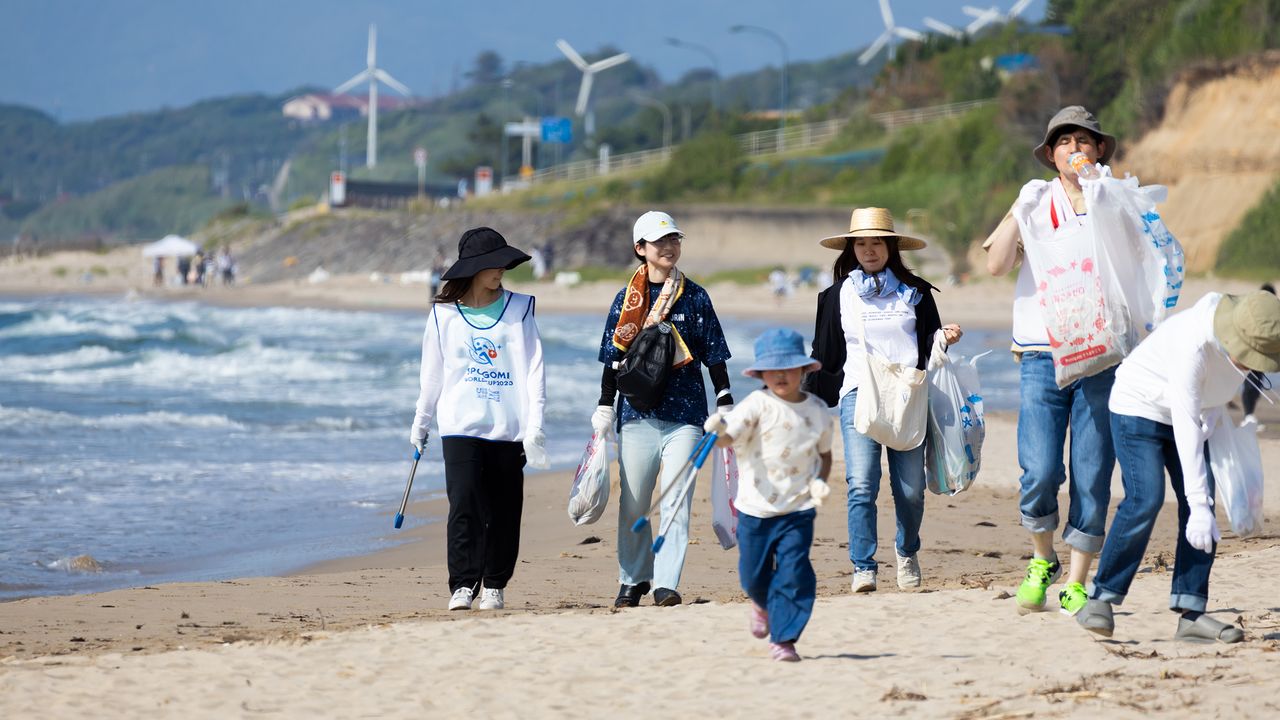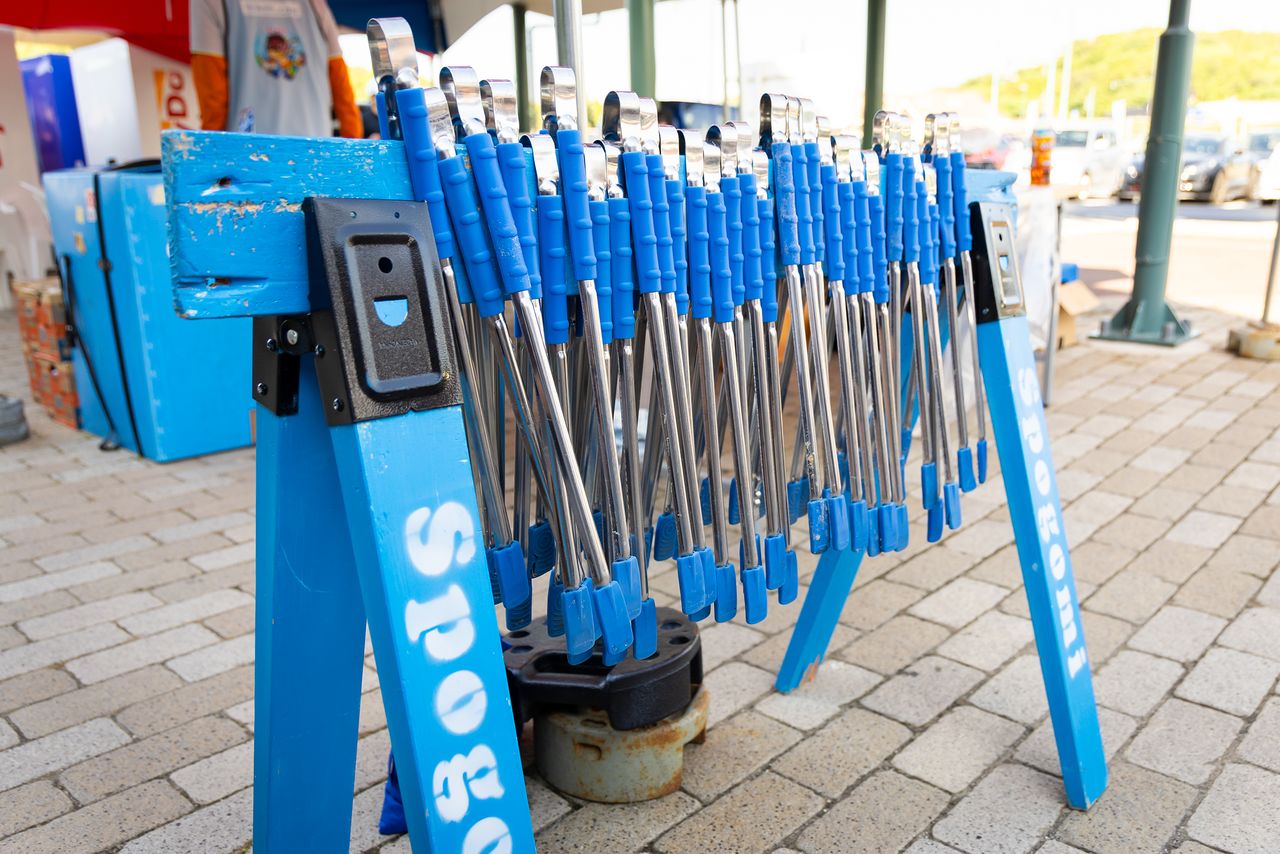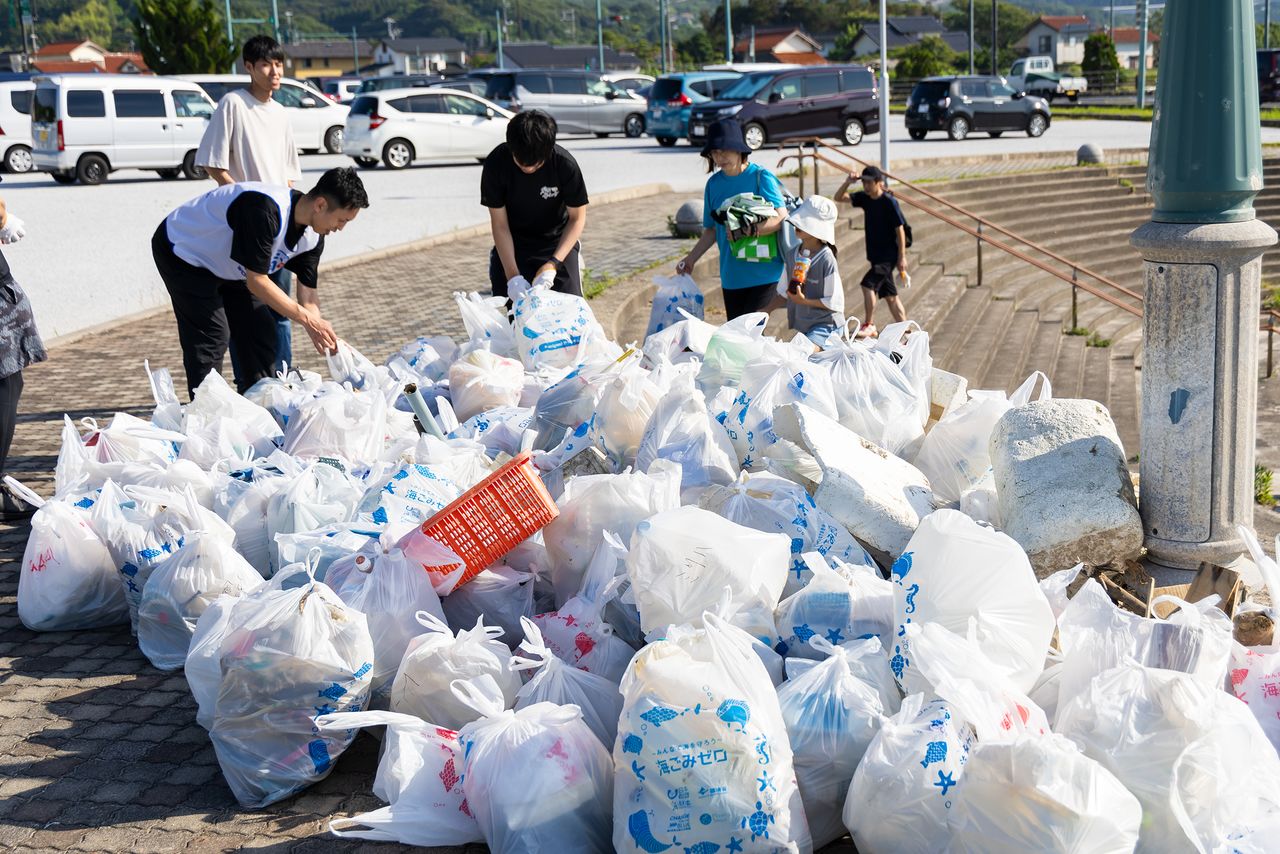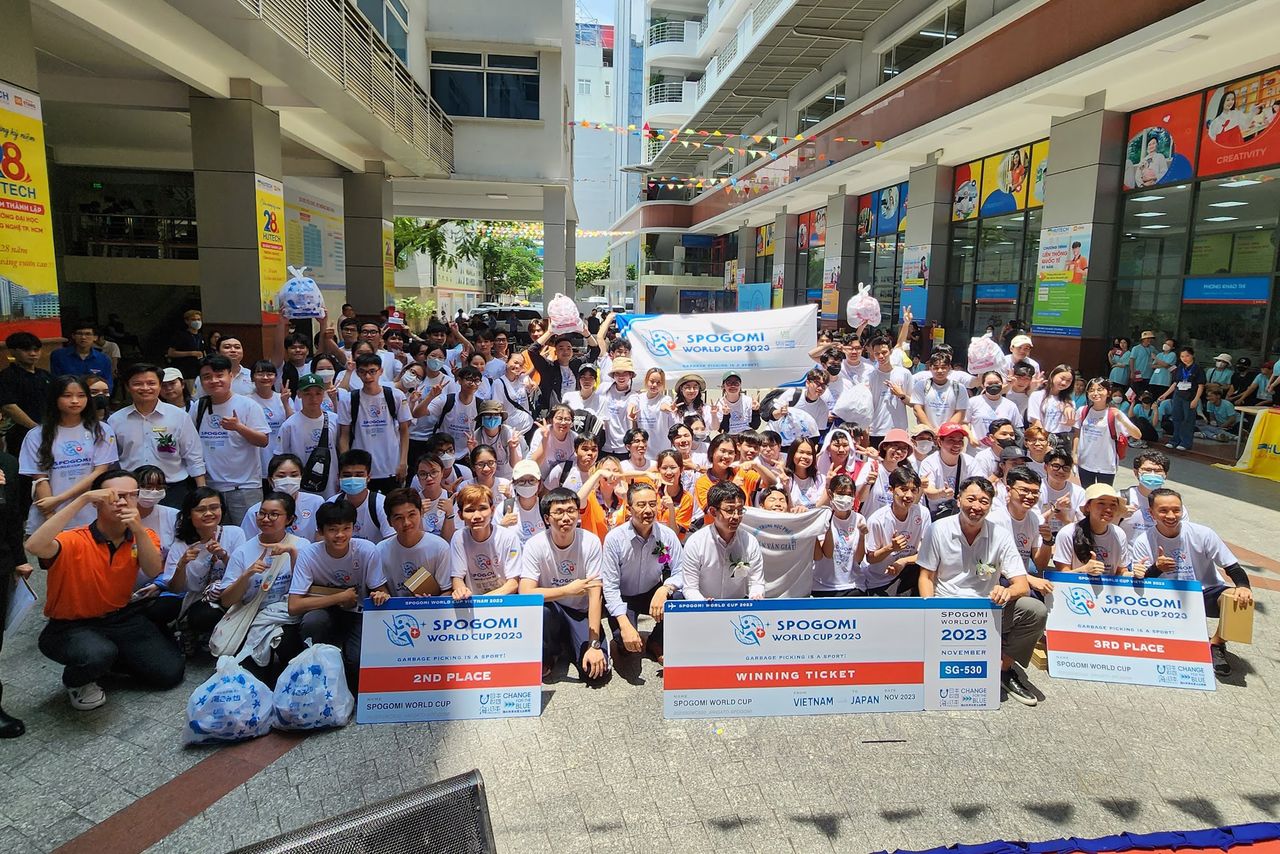
Competitive Litter-Picking: The SpoGomi World Cup
Society Environment- English
- 日本語
- 简体字
- 繁體字
- Français
- Español
- العربية
- Русский
Cleaning Up as Competition
Families were hard at work clearing up litter on May 27 in the Saitama preliminary round of the SpoGomi World Cup, when a young boy excitedly announced that he had found something that would really help his team—a cigarette butt.
SpoGomi, competitive litter-picking, was born in Japan in 2008. Under competition rules, a three- to five-person team picks up litter within a designated area and time limit. Some SpoGomi competitions are held in urban areas, so no running is allowed. After time is up, participants sort trash by category, weigh the collected trash, and compete on the basis of points earned. With the competition area left clean as a whistle, SpoGomi—whose name combines “sports” and gomi, “trash,” is often called the world’s most environment-friendly sport.

SpoGomi is family fun. (© Nippon.com)
Competition rules vary somewhat, from the number of team members allowed to the points earned by type of litter. Under the rules for World Cup regional preliminary rounds, three-member teams are given one hour to pick up litter. Burnable and nonburnable trash earn 10 points per 100 grams, cans and bottles 12 points, and PET plastic bottles 25 points. Cigarette butts earn the highest score, 100 points.
Collecting trash to earn points by weight is hard work, but all teams have a fighting chance of winning if they strategize by concentrating on picking up high-scoring items like cigarette butts and PET bottles.

Young teens are especially good at picking up litter. (© Nippon.com)

Trash sorting. Smokers often discard cigarette butts in beverage cans or bottles. (© Nippon.com)
Ōmiya Park, the site of the Saitama regional competition, is well maintained and competitors could be heard “complaining” that its pristine condition left little trash to be found. Even so, the 23 participating teams ended up collecting 37.47 kilograms of rubbish.
The winning team of three adult men earned 1,130.9 points for the 10.71 kilograms of trash they had collected. The three teammates, regular participants in neighborhood litter pickup drives, noted that trash is often discarded in unobtrusive places. Their strategy of concentrating their search for litter under bushes and other such spots paid off with a win.

The weigh-in: Members are tense and excited about learning their result. (© Nippon.com)

The Saitama round teams pose with their litter haul. The three-member winning team sits at front row center. (© Nippon.com)
Pick Up Trash and You Will Never Litter Again
SpoGomi was started in 2008 by Social Sports Initiative, a general incorporated association, and has organized a yearly competition every year since then. Making litter pick-up a “sport” widened the appeal of the activity appeal, whose aim is to raise awareness of helping make things better for everyone while having fun at the same time.
Joining with the Nippon Foundation’s Ocean and Japan Project, Social Sports Initiative began holding the SpoGomi Kōshien, named after Japan’s famed high school baseball tournament, in 2019. High school students winning regional elimination rounds compete in a national tournament in Tokyo. To date, over 130,000 young people have participated in the SpoGomi Kōshien.

Official Spogomi tongs, ready for action, are safe and easy to use for everyone from kids to seniors. (© Nippon.com)
SpoGomi has even spread worldwide, attracting teams from 21 countries competing in the first-ever SpoGomi World Cup, slated to take place in Tokyo in November 2023. Elimination rounds are currently underway in Japan’s 47 prefectures as well as participating foreign countries.
At a February 2023 press conference to announce the SpoGomi World Cup, Nippon Foundation Chairman Sasakawa Yōhei explained that 70% to 80% of all marine litter comes from urban trash being carried along rivers into the ocean. His hope is that popularizing SpoGomi will help reduce plastic marine litter, which is causing problems worldwide.
Matsuda Takeshi, a former competitive swimmer and SpoGomi World Cup ambassador, noted that anyone who has ever picked up trash avoids littering later. He drummed up support for the event, saying that “SpoGomi ties in with the aims of the UN’s Sustainable Development Goals, but many people don’t know where to start. Participating in SpoGomi is doable for everyone, young and old, with high-impact results.”

From left: Sasakawa Yōhei, chairman, Nippon Foundation; professional climber and World Cup ambassador Nonaka Mihō; swimmer Matsuda Takeshi; former AKB/SKE48 singing group member Yamauchi Suzuran; and Yanai Kōji, director of Fast Retailing Co., which donated funding for the tournament. (© Nippon.com)
Strategy Is Key
Izumo Kirara Beach was the setting for the Shimane Prefecture elimination round on June 18. Participants were raring to go, saying “Onward to Tokyo!” or already thinking of how to enjoy the big city if they won.
The SpoGomi national tournament, where the team representing Japan will be decided, takes place in Tokyo in October. Regional winners’ travel is paid by SpoGomi, so the incentive of a trip to the capital is likely to be strong motivation, especially in regions far away.

The Shimane elimination round kicks off at Kirara Beach. Which of the teams will make it to the finals in Tokyo? (© Nippon.com)

Even little kids pitch in to help. (© Nippon.com)
When the competition starts, everyone stalks the beach looking for litter. The beach appears clean, but PET bottles and fishing lines have washed up at the water’s edge. There are even plastic fuel tanks, Styrofoam, and other large chunks of debris wedged between the breakwater pods. Walking along the 1-kilometer stretch chosen for the competition, teams are exposed to the merciless sun.
Team members must stay close together, never moving farther than 10 meters apart. There are fewer rivals competing for trash if teams fan out, but walking on sand takes a lot of effort. If they go too far, they will run out of time to make it back to the starting point for the weigh-in and have points deducted for being late. Thus, it is important to devise a good strategy for staying among the top teams.

Teams fan out on the beach to pick up litter. (© Nippon.com)

This all-girl team displays its haul. (© Nippon.com)

Carrying litter under the blazing sun is hard work. (© Nippon.com)
The 25 teams ended up collecting 210.47 kilograms of garbage. Competition organizers noted that while the cleanliness left behind was welcome, turning up so much trash was not a good thing, and that finding over 200 kilograms of trash on a Shimane beach was like having a trash pick-up competition in the middle of Shinjuku.
The winning team, three childhood friends from Matsue, had a haul weighing 40.86 kilograms, placing them far ahead of all the other teams. Participating in SpoGomi for the first time, they noted that in daily life they were careful not to litter, and that collecting and bringing the beach trash back to the start line was pretty hard work. Winners in Shimane, they vowed to come in first at the Tokyo meet and to go on to win first place in the SpoGomi World Cup as the team representing Japan.

The clean-up drive collected over 200 kilograms of trash. (© Nippon.com)

The winning team members. Picking up a huge number of cigarette butts boosted their score to 4,936.2 points. (© Nippon.com)
Overseas Elimination Rounds
Overseas participants are keen to travel to Tokyo for the World Cup. The winning teams in participating countries are a broad mix of people, with each country approaching the competition differently.
While the SpoGomi litter-picking method is the same the world over, different countries have their own household trash sorting criteria and public trash collection systems. In Vietnam, trash sorting is not routine, and competitors had to consult the rule book to sort the trash collected. Before taking part in SpoGomi, quite a few of them said they had never been aware that certain types of trash are recyclable resources.

A Vietnamese team sorting trash as they consult the rule book. (Courtesy of the SpoGomi World Cup Operating Committee)

In Vietnam, many young people participated in the preliminary rounds. A total of 40 teams collected 72.6 kilograms of trash. (Courtesy of the SpoGomi World Cup Operating Committee)
In Indonesia, “trash banks” have sprung up in the past few years. Residents sell their trash to recyclers, with part of the proceeds going into a “bank” account. This motivates households to sort trash to build up modest savings.
These “trash bank” employees won the Indonesia competition. They joined the competition because they believed that SpoGomi was a fine way to raise awareness of environmental issues, and their work-related knowledge of the ins and outs of trash gave them an edge.

The winning Indonesian team, employees of a south Jakarta “trash bank,” collected 132.6 kilograms of litter. (Courtesy of the SpoGomi World Cup Operating Committee)
In soccer-mad Brazil, media outlets writing about the SpoGomi World Cup never failed to mention how Japanese sports fans have impressed the world by picking up their trash at the soccer World Cup and the Olympic Games. They encouraged Brazilians to emulate this positive element of Japanese culture and join the SpoGomi competition.

A group of Japanese-Brazilians, who make it a habit to pick up litter regularly, participated in the preliminary round in Brazil. They notched up a respectable record, collecting 179.2 kilograms of trash. (Courtesy of the SpoGomi World Cup Operating Committee)

Members of the winning Brazilian team exult in victory. (Courtesy of the SpoGomi World Cup Operating Committee)
The three-member winning team in the Brazil elimination round credited their success to training with an eye on taking part in SpoGomi.
The teams representing the various countries included all kinds of people, showing that SpoGomi is truly a universal activity open to every age and type of person. Local fans of the sport are looking forward to the SpoGomi World Cup in Tokyo in November and hoping that the Japanese national team will do well.

Picking up litter is healthy exercise. (© Nippon.com)

SpoGomi’s ultimate goal is to clean up the planet so well that litter pick-up tournaments are no longer needed. (© Nippon.com)
(Originally published in Japanese. Banner photo © Nippon.com.)
